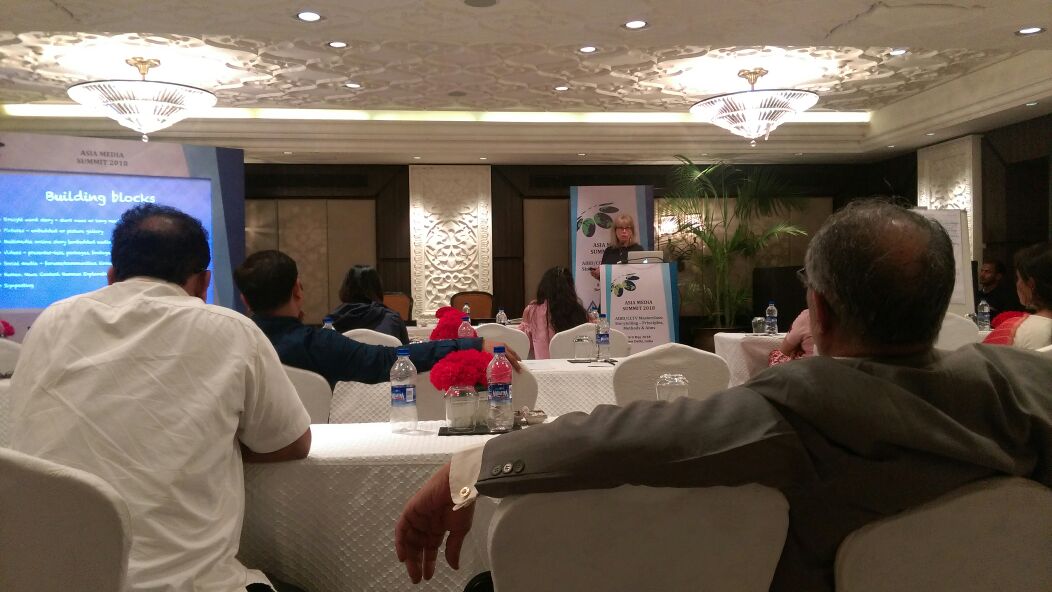Story Telling: Principles, Methods and Aims
“This abundance of information is not the same as understanding, and hence creates new challenges for the audience”, said Sarah Gibson, President of AIMMP, while delivering an intellectually stimulating pre-summit talk on the theme based on principles, methods and challenges of storytelling.
Jahanagir Hall of Taj Diplomatic Enclave was gushed with pundits from the field of broadcasting, radio and print on the day of the event. The positive learning environment continued for more than three hours where the host introduced blocks of storytelling to its audience, along with making them aware of the rugged transition from old-school storytelling methods to the presently engineered ‘post-truth’ content from the newsrooms.

The monopoly of content from the past has been hunched up by chunks of information, present all over the internet. The audience searches for a steadfast narrative in them, but the credibility of the information is barely cross-checked. Their loss of belief in the authority has paved way for the concept of citizen journalism, through which stories from across the world are finding their space in the digital media world. Though it is a welcoming change, Miss Gibson highlighted that storytellers from across the world need to use visionary alternative modes of communication to capture the audience’s short-spanned attention, along with regaining their trust on the centuries-old institution back.

She explained working domain of a journalist in a much believable manner “There is no other profession out there which gives you the opportunity to make a difference through telling stories about what’s really going on”. She was also alarmed by the fact that standard form of journalism is a thing of the past and added that the audience has developed the distaste for heavily editorialized and negative stories. Young people all over the world are looking for the solution to their problems, and the first thing which they command is transparency of the media.

Later on, she wisely categorized news and factual content in five symbolic modes- basic factual content we all must know stands for a teacher; self-improvement knowledge to zoom ahead in life can be seen as a life coach; perspective of unseen depth which is not agenda driven can be seen as a challenging person; interesting human stories about things reminds us of a storyteller and finally discursive and expanded knowledge of a passionate thing or place is appropriate to be tagged with a best friend.
The most nerve chilling moment of the whole discussion was when she showed a three-minute video titled ‘Your Phone is now a Refugees’ Phone’ shot by BBC Media Action. The heart crunching story begins when a daughter from a war-stricken country is fleeing from her place, and she updates her whereabouts to her father through a smartphone. With the help of GPS, WhatsApp and mobile camera he is helping her in crossing the border until her phone gets distorted in a fight. The video ends with a powerful scene where multiple people are tapping on a smartphone, but the refugee crisis is not getting deleted from their phones. This is ironic in the fact that although social media has made our life easier, it is not the solution to every problem.

The audience was also rendered with some basic knowledge about augmented reality and virtual reality which are the emerging trends in this globalized world. Some effective strategies were also discussed formulating appropriate content while keeping in mind the essentiality of a feedback system. The insightful session reached its end when the host of the day was given a token of honour, to valorize her credentials and efforts for the session.
Article reported by Garvita Sethi, while Pre-Summit workshop was managed by Fathimath Leeza.









